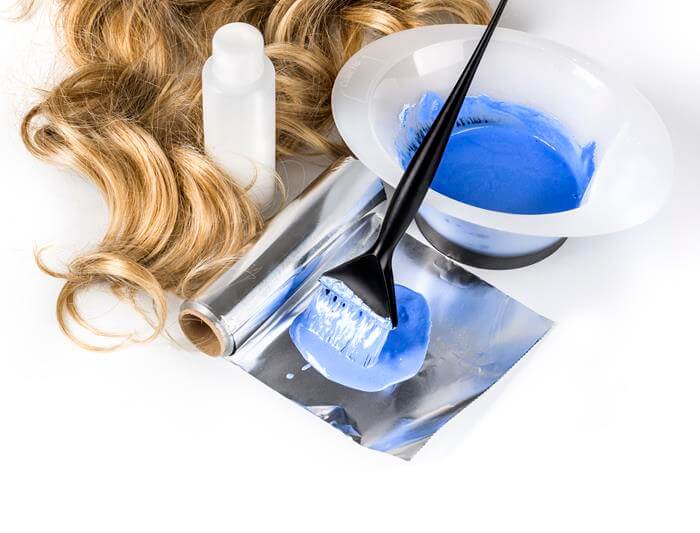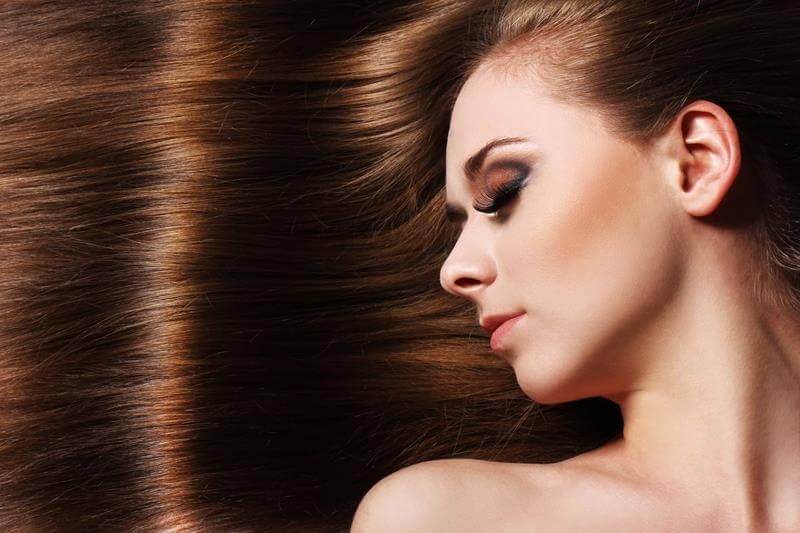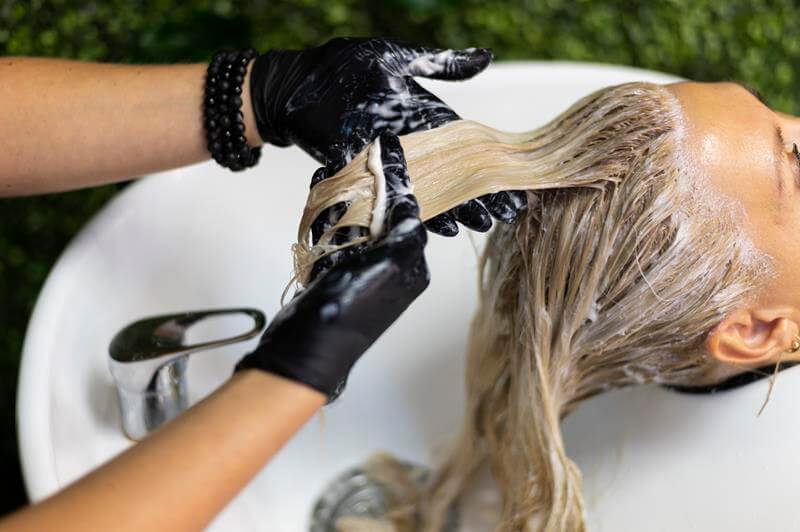But what are the best natural, plant-based, harmless, vegan, and non-toxic hair dyes? What is better to use instead of chemical-based ones? In this article, we explain what plant based hair dye is, and its advantages, which are also cruelty-free hair dye and environmentally conscious.
What Is Plant-Based Hair Dye?
Normal hair dyes contain chemicals that cause risks to human health, animals, and environmental life. Such chemical ingredients as ammonia, hydrogen peroxide, p-phenylenediamine, and others can damage the integrity of the hair.
Natural plant based hair dye is considered free of harmful chemicals. It is made from natural ingredients, ensuring that no harsh substances are used in the coloring process. Cruelty-free hair dye and vegan hair dye are excellent alternatives to traditional synthetic dyes, offering a more ethical and eco-friendly choice.
Moreover, natural components dye hair gently, carefully, and reliably. They have a wide palette of colors from blonde or light brown to red or black. In addition, they have not been tested on animals.
Benefits of Natural Hair Dye
In recent years, natural hair dye has gained significant popularity among individuals pursuing a healthier and more eco-conscious lifestyle. It serves as a superior alternative to conventional chemical dyes, offering numerous health and environmental advantages.
Plant-based hair dye provides a range of benefits, making it a sustainable and thoughtful choice for hair care:
- A greener choice for persons with hypersensitivity.Hair dye sensitivity is a usual problem, making it impossible for every user.
- Gentle hair care with phytochemical properties.Thanks to its natural composition, it not only adds color to dull or gray hair but also cleanses the scalp and balances the pH level. Thus, the scalp becomes cleansed and nourished, and the hair gains shine.
- Ecological and sustainable hair care. One of the biggest advantages of herbal hair dye is that it is made entirely of natural ingredients. Herbal hair dye is the best choice among hair care products because it is non-toxic to the human body and does not harm the environment, as chemical residues do not enter wastewater.
Plant-derived ingredients in natural hair dyes offer numerous benefits beyond coloring. They provide antioxidant, and antimicrobial benefits, promoting overall scalp and hair health while delivering beautiful, natural color.
Common Ingredients in Plant-Based Hair Dye
Cruelty-free dyes are not only gentle hair care, but also a way to maintain their health, while achieving a beautiful shade. It is important to understand what ingredients are the basis of such cosmetics to choose the most suitable option. The main components of plant based hair dye for coloring are herbs, herbal extracts and oils, vitamins, proteins, and other nourishing and moisturizing components. Most often, Lawsonia is used, from the leaves of which henna is obtained, and Indigofera is a source of material for Basma. The dye may also contain plant extracts and powders for care, strengthening, healing, and regeneration. For example, Cassia restores elasticity, Amla nourishes, Neem moisturizes, and Shikakai eliminates brittleness.
Plant-based hair dye for gray hair offers natural, long-lasting color while strengthening and nourishing damaged strands. It enhances the hair’s texture, providing a smooth, vibrant appearance from root to tip.
Is This Hair Dye Suitable for Everyone?
Natural plant based hair color products are suitable for everyone, as they are made only from natural ingredients. Anyone can use plant-based dye for all skin and hair types.
But it’s best to do an allergy test before dyeing your hair for the first time. This way, you can test-dye a section of dirty hair, not freshly washed, as the natural oils in your scalp will help protect you from any sensitivity that some people may experience.
Natural vs. Chemical: Key Differences
Natural plant based hair dye – henna, basma, walnut, tea, coffee, onion peel, chamomile. They should be used on hair that has not been previously dyed with chemical dyes. Natural dyes do not harm the hair. On the contrary, they give the hair shine and silkiness. The only drawback is the lack of color fastness in this dyeing option. Each time after washing, part of the coloring pigment is washed out. Therefore, if these dyes were chosen for dyeing hair, the procedure would have to be repeated each time. The exception is henna and basma, as they retain the color much longer.
All natural dyes should be applied to damp, clean hair using a sponge, brush or cotton swab. When changing hair color, you need to cover your shoulders with a film, bag or old towel and put on rubber gloves.
How to Choose the Right Natural Hair Dye for You
Natural hair dye is an excellent solution for those who care about the health of their curls and are looking for a safer alternative to chemical compounds. But how do you choose the right product among the many options?
When opting for natural hair dye, pay attention to the composition – avoid ammonia and synthetic additives. For thin hair, choose moisturizing products; for thick hair, choose strengthening products. Be sure to do an allergy test, choose trusted brands and consider the shape of the paint for ease of use.
Best Plant-Based Hair Dye Brands
After thorough market research, we’re excited to share a curated list of the best plant based hair dye brands. Here, you’ll find a range of certified items with natural ingredients:
Green Hare is a small-batch, hand-made hair dye brand from the USA. Their cruelty-free and vegan products are made from plant-based and mineral ingredients.
Best For: Grey coverage and long-lasting natural color dyes.
Price Range: $19.95 – $31.95.
Splat Naturals is made by Developlus, established in 1991 in California. Their semi-permanent conditioning hair dyes are Vegan, cruelty-free, and gluten-free.
Best for: Pastel, deep, intense colors, semi-permanent dyes.
Price Range: $14.24 – $16.99.
Bleach London is a UK-based salon focusing on coloring hair, not cutting it. Their range of bleach Kits, toners, semi-permanent dyes, and high-end care for bleached and colored hair was the result of 10 years of hard work and tweaking.
Best For: Bleached, toned, and neon-intense color dyes.
Price Range: $7.49 – $17.99.
Surya Brasil is a natural, organic, cruelty-free, and vegan brand from Brazil. They make several different cosmetic and personal care products, including henna powder and henna cream hair dyes.
Best For: Natural shades and burgundies, semi-permanent color.
Price Range: $21.99 per box.
Good Dye Young is a haircare and color brand that is both cruelty-free and vegan. They make a stunning array of bright, vibrant colors that are mixable to get the perfect shade. Good Dye Young semi-permanent vegan hair dyes last 6 to 8 weeks and are ammonia-free, formaldehyde-free, peroxide-free, and PPD-free.
Best For: Bright, vibrant colors that are very temporary and semi-permanent.
Price Range: $17.5 (hair colors) – $30 (haircare).
Tips for Maintaining Hair Colored
Try to avoid direct sun rays, swimming in pools with chlorine, and frequent use of styling tools (hair dryers, curling irons, tongs). After dyeing, you should avoid any products containing sulfates (sodium laureth sulfate), petrochemical ingredients, phthalates, synthetic fragrances, and silicones. And give preference to a normalizing shampoo that will maintain the beauty and color of your hair for a long time.

Myths About Plant-Based Hair Dye
Myth #1 – Longer waiting – brighter color.
If you leave the dye on your hair longer, the color will be brighter and more durable. If you leave the dye on longer than you should, you can damage the hair structure, but you still won’t be able to achieve a more saturated shade. It’s best to use the time indicated on the hair dye package or insert.
Myth #2 – Frequent dyeing can lead to hair loss.
If you want to dye your hair for the rest of your life, you don’t have to worry about losing your hair. The main thing is to choose high-quality dyes from well-known manufacturers correctly and competently. Also, if you carefully care for dyed hair, you will not encounter the problem of hair loss. After all, even undyed hair needs special care.
Myth #3 – There is no such thing as harmless hair dye.
Plant-based hair dyes are safer than chemical dyes thanks to their natural ingredients.
Myth #4 – There is no necessity to check information about cruelty-free hair dye.
Not all natural cosmetics brands are ethical. While most hair care cosmetics manufacturers strive to adhere to ethical standards, there are brands that still test on animals or use ingredients that may have traces of such testing. Therefore, it is necessary to verify information about the paint manufacturer.
Conclusions
Plant-based hair dye offers vibrant color, natural shine, and promotes hair health and strength. The guide explores various types of vegan hair dye, how to choose the perfect shade, and showcases leading cruelty-free and vegan brands. Opting for cruelty-free hair dye not only supports healthy hair and scalp but also aligns with ethical and eco-friendly values. As the market for cruelty-free and vegan cosmetics expands, consumers now have access to a broader selection of products that are better for the environment, animals, and personal well-being.
FAQ
What plants are used to dye hair?
The most commonly used plant-based dyes are henna, indigo, cassia obovata, and amla. Henna gives red, cassia yellow, and indigo blue, so these basic colors can be easily mixed to create new shades.
Is herbal hair color safe?
Plant-based hair dyes are safer than chemical dyes thanks to their natural ingredients.
How long does plant-based hair dye last?
Plant-based hair dyes can last up to two dozen hair washes. With each subsequent wash, the tinting washes out and the color becomes lighter.
Is there plant based hair dye for grey hair?
Ayluna or black tea plant-based hair dyes give a natural look to hair.

Author

Anna Smirnova
Content writer on https://rythmoftheworld.com From my practicing in science, I brought the skills of discovering, analyzing, and explanation. I adore art, photography, traveling, hiking, and winter.



